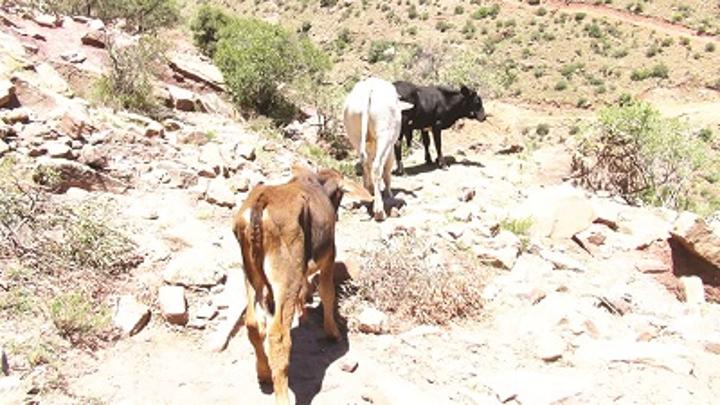Africa-Press – Lesotho. QACHA’S NEK – As Lesotho is an enclave of South Africa (SA) not only does these two neighbours share opportunities but they also have fair share of the challenges between their citizens.
Once in a while these two nations have their inhabitants at loggerheads with the other territory due to their close proximity and sometimes interdependence.
Lesotho shares the border with SA’s three provinces: Free State, KwaZulu -Natal and Eastern Cape. One such problem which has for many years troubled Lesotho and her neighbouring state, SA is that of stock theft.
This is two way in that, the South Africans steal Basotho livestock and Basotho also steal the South Africans livestock especially in towns and places which share the border with that
country. Generally the livelihoods in the rural settings are dependent on the livestock for survival. Livestock species common in Lesotho are cattle, sheep, goats, horses and donkeys.
Livestock theft is allegedly rampant in farming communities. The two countries are only separated by the mountains. Unlike in some places where there is a fence which is manned and
separates the two countries, there is an exemption with the Qacha’s Nek district as it is divided by the mountain terrains with the neighbouring town of
Matatiele in SA. While the major challenge of stock theft is that of the trans-border stock theft, there are also reported cases of rustlers within the local communities at that district.
Stock theft is a crime and is punishable by law. The Stock Theft Act, 2000 says that the crimes related to stock theft from tempering with the bewys, committing stock theft and threatening another
person with firearm or other offensive weapon will attract the sentences from three years imprisonment or fine from M7 000 to a fine of up to M40 000 or a 20 years’ imprisonment. Stock theft is also reported to decrease the production of wool and mohair which causes the farmers to lose income in the long run.
Informative Newspaper
held an interview with the Qacha’s Nek District Administrator (DA) Mantsi Tšeane and that District Police Commissioner (DISPOL) Superintendent Thembinkosi Sibanda to learn first-hand how this crime has affected the
community, what measures are in place to tackle it and how the community involvement can help buttress it. Superintendent Sibanda said the stock theft is one of the crimes common in the district to be reported at his post.
He further highlighted that the stock theft is rife along the cross-borders. The DISPOL also mentioned that Qacha’s Nek is surrounded by the mountains which have many passes which are used by the
rustlers making it difficult for police to trace them and recover those animals. He said the stolen animals from Lesotho are cattle, goats, sheep, horses and donkeys and so in SA Basotho nationals also steal the same animals
but the donkeys. Superintendent Sibanda said they hold joint operations with their South African Police counterparts, adding that there has been an improvement borne by their joint efforts.
The joint operations of police and those of the animal farmers he said they have helped prevent the stock theft in both countries. He said the stock theft between the two towns,
Qacha’s Nek and Matatiele in SA affects the relations of the inhabitants of these places. The other challenge he said is that of the Basotho nationals who have relocated to SA in that they are familiar with
both the passes and the land dividing the two towns and are usually the suspects. According to the study titled Stock Theft and Human Security: A Case Study
of Lesotho, “Stock theft has become a national crisis in Lesotho. Stock theft presents a challenge to the consolidation of the fragile democracy in the
Kingdom of Lesotho as it impoverishes people and causes conflicts within and between villages that in turn threaten stability. In cases of theft the livestock owner loses all the economic value of livestock and is left
destitute. This affects the entire household, the community, and the country. ” It is reported that the transnational stock theft is perpetrated by the syndicates
which operate between the two countries. The Lesotho Rural Livelihoods Baseline Profiles report published in 2012 says, “The livestock sector is also affected by rampant cases of
stock theft. ” It further says: “The prevalent cases of stock theft can be addressed through improved policing and branding of livestock in order to reduce the significant losses of livestock,
mainly sold in urban areas and neighbouring areas of South Africa. ” Asked what resources are needed to mitigate this crime, Superintendent Sibanda said due to cumbersome terrain of
the district, they need the helicopter to improve their recovery efforts. Although, he could not provide the figures of the reported cases, he said the cases have significantly dropped.
This he attributed to cooperation with the members of the public and other stakeholders. Although there are still reported cases of stock theft, Sibanda said they are not as regular as before.
Asked about the challenges the police face in recovering the livestock happening within the two countries, he said the terrain of Qacha’s Nek poses a problem for their
reaction time when they receive the report that Basotho livestock is being stolen. He however applauded the community policing joint forces to tackle this
crime, adding that they exchange regular communication on the missing animals via phones and those are easily recovered and reclaimed by their rightful
owners. As part of their crime prevention approach, he mentioned that they are working closely with the community policing groups within the villages as the former’s duty is to man the villages
and the movements making way into and out of their villages especially at night. One of the mechanisms introduced by the government to curb the stock theft without the communities was that of marking
the animals through tattooing method. The National Livestock Registration, Marking and Information System (LRMIS) under the Ministry of Home Affairs introduced this method to “allow [the] country to trace animals and improve the
management of its livestock”. Qacha’s Nek was one of the districts in which this programme was piloted in 2006 before the report on performance was presented before the parliament for adoption of the operationalization of
tattoo marking system. These tattoo markings are also unique in that the markings are uniquely designed for certain area being one of the distinctive features used to recover the stolen animals.
Further, the Stock Theft Act, 2000 requires that the owners register themselves as well as their animals. For his part the DA echoed similar sentiments as the DISPOL that the stock theft is one of the problems that had
rocked their district. Tšeane said some of these rustlers are allegedly on the run from the long hand of law and have relocated in SA. Describing their modus operandi, he said
they do not steal the animals but they “capture” them. The DA also acknowledged the recovery efforts by the police saying their operations are proving
‘successful’. Notably, he highlighted that the residents of Matatiele are now cooperative in that they can drive the animals
to the Lesotho border when they are astray or allegedly stolen, in the past he said they did not do this. He also mentioned that lack of resources especially cars make it difficult for police to discharge their duties.
Tšeane said stock theft has caused some casualties as there are cases of loss of life during the process. He said when they raid people’s kraals, the rustlers come armed and an attempt to stop them
is met with firing of shots. DA said the police and members of the army’s protection is paramount in the recovery operations. The Lesotho Defence Force (LDF) members
are amongst others charged with the responsibility to man the Lesotho borders and protect citizens’ properties. It was last year July when two members of the
LDF were arrested while in operation to recover stolen Basotho livestock by the South Africans at Ha-Ramatšeliso in the outskirts of Qacha’s Nek. Almost a year later those
members of the LDF remain incarcerated in SA while awaiting trial. Following this incident, the LDF issued a statement saying: “The command affirms to the nation of their resolve to
protect the country, members of the public and their properties. ” Also at the separate incident in 2004, there was a report issued to the effect that a member of the LDF was found dead at Ha-Ramatšeliso in the outskirts of Qacha’s Nek allegedly in operation.
For More News And Analysis About Lesotho Follow Africa-Press






